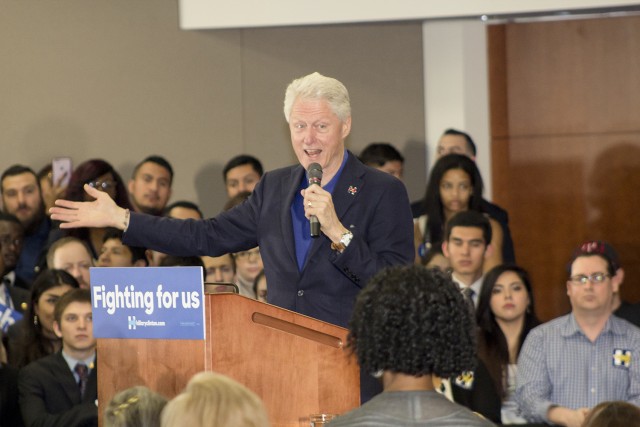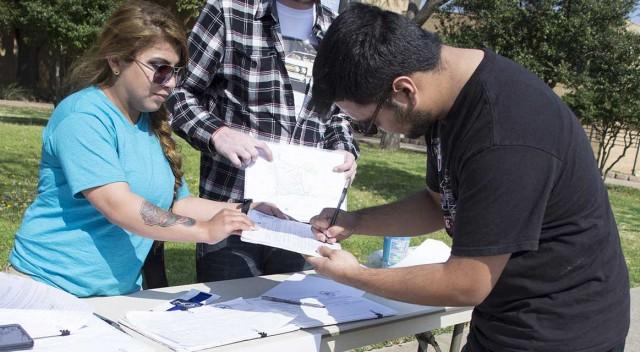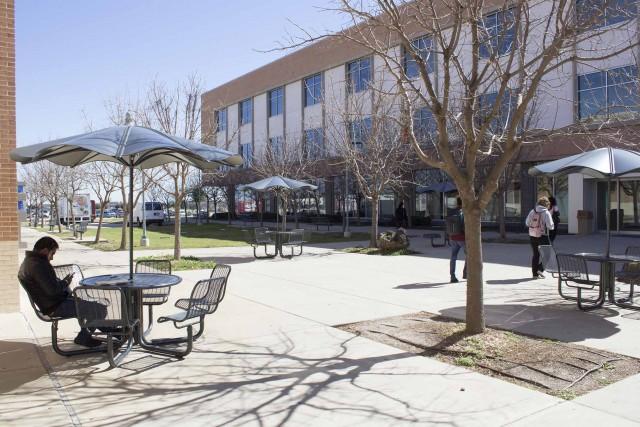By Martin Ramirez/ reporter
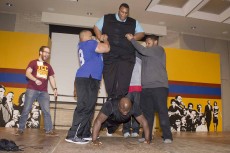
Photos by Bogdan Sierra Miranda/The Collegian
African-American heritage and the importance of an education were commemorated during the districtwide Celebrating Strides on NW Campus Feb. 24.
The event combined performances and speakers that celebrated strides made by former and current students. Events included video history, storytelling, a poem reading, motivational speeches and various performances that led to keynote speaker Keith Davis.
The event paid tribute to former Chancellor Erma Johnson Hadley, whom NE student development services vice president Maggie de la Teja said “gave birth to the event.”
SE English instructor Arlandis Jones discussed the Harlem Renaissance while a video played in the background. Beginning with people heading north from the Jim Crow South to the emergence of artists such as Duke Ellington and Fletcher Henderson, the speech showed the importance of this time for African-American history and art.
“The Harlem Renaissance was the movement of Black American culture as well as a celebration of African-American identity,” he said. “It was a period of America where the black heritage flourished.”
Decee Cornish of Pantagleize Theatre presented “It Was Time for Change,” a story of the struggle to integrate schools in 1957.
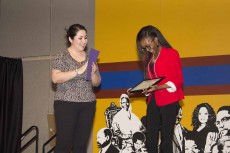
“A long, long time ago, in a land far away … it all began in Little Rock, Arkansas,” he said as he told of the troubles nine African-American students faced when they tried to attend Little Rock Central High School.
TCC South alumnus Anthony Douglas presented “Bass Poetry” with bass player Vincent Hayes. His poem described the history and hardships of African-Americans.
“There’s no denying our past,” he said. “Know that amazing grace awaits under muddy waters. Tis our light, not our darkness, that blinds us.”
NW math professor Archie Wilmer told his story about “never-ever moments,” struggling with school and then making West Point Military Academy history.
“A never-ever moment, everyone has them,” he said. “My [elementary school] teacher said I would never-ever be good at math.”
Wilmer has proved that teacher wrong. He was the first and currently the only African-American West Point graduate to obtain a doctorate in applied math. Later, he became the first African-American West Point graduate with that graduate degree to return to his alma mater and teach in the math department. And he is still the only one to hold that distinction.
Janekka Colbert, a former TCC student, returned to college after realizing her child expressed similar feelings she once had.
“I thought only a certain group of people were smart,” she said. “I thought I wasn’t one of them.”
After a rough first semester, Colbert found success with help from school seminars and professors, leading her to graduate magna cum laude at Texas Christian University.
“I stood up and I fought for my education. … Strive to be a victor,” she said.
LaDoris Pope was raised by a family where her grandmother had a third-grade education, her father a sixth and her mother a ninth. While living in a homeless shelter in Fort Worth, Pope was approached for Hadley’s Visions Unlimited, a program that led to her current pursuit of a master’s in educational psychology.
“Education is the key to everything,” she said. “My purpose on this Earth is to help others. Educate yourselves to learn to live together.”
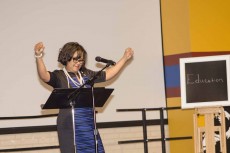
Performances included Aliyia Williams singing the national anthem and “Lift Every Voice and Sing,” “Tehila,” a dance to “Four Women” by Nina Simone and “Rhythmic Vocabularies” by NW’s Mosaic Dance Project.
The Beth Eden Missionary Church dance team and mime gave two performances: a dance and mime to “Glory” by Common and John Legend and a single mime to Martin Luther King’s “I Have a Dream.”
Former NFL player Keith Davis brought a friend whom he called the strongest football player in Florida State University history, Clarence Lee. Together, they asked six young men to come on stage for a presentation. Labeling them “little dream, average dream, big dream and big ol’ dream,” according to their size, Davis asked them to stand on Lee’s back one at a time as Lee did pushups.
Davis said to “PUSH” or to perceive until success happens. Both players had tough childhoods. Davis’ father committed suicide, and his mother faced alcoholism and an abusive boyfriend.
Lee said the hardest thing he had to overcome was his father passing when Lee was 13. However, Lee believes he is living his father’s legacy by learning to be strong inside.
“Forgive even the person that beats you up, and you will be the strongest person,” Lee said, advice a friend gave him.
Davis said life, like a football game, has a first half and a second half. He told the story of winning a game against an undefeated team where his team did terrible at first but won in the second half.
“We live in a nation that has a horrendous past. That’s the first half. … ,” he said. “Martin Luther King said he had a dream because he believed in the second half.”
Davis said he never intended to become a speaker but was driven by “pure passion to help.” One of his biggest inspirations was Edwin Lewis Cole, founder of the Christian Men’s Network, who once said, “Winners always look at what they’re going to, and losers always look at what they’re going through.”
South alumna Ingred Thompson enjoyed the event.
“I’m coming back next year,” she said.
Sarah Aston, a local resident, attended with a student friend.
“I really learned a lot, and I did not expect it to be so good,” she said.
NW dean of public services and social/behavioral sciences Sonya Brown ended the event by urging the crowd to repeat, “Looking back, moving forward, what about me?”






















